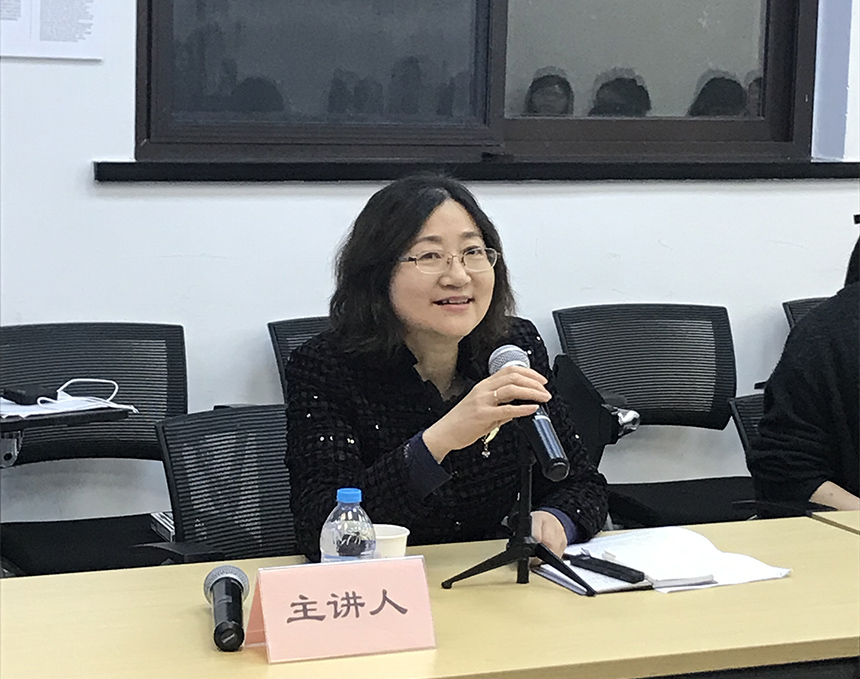
Fudan Institute of Belt and Road & Global Governance holds the lecture “Japan's Cognition and Corresponding Policy for the ‘Belt and Road’” On May 6th, Professor Bao Xiaqin from the School of International Relations and Public Affairs of Fudan University gave a lecture entitled “Japan's Cognition and Corresponding Policy for the ‘Belt and Road’” in the Zhiku Building 106. The lecture was hosted by Professor Guo Dingping. Professor Huang Renwei, Executive Vice President of the Fudan Institute of Belt and Road, gave a comment on the lecture.
Professor Bao believes that Japan’s response to the Belt and Road Initiative has changed has changed as its perception changes. During the period of 2013-2017, the Japanese government was not optimistic about the “Belt and Road”. Its basic standpoint was that it does neither support nor take part in such an initiative. However, since 2017, the Japanese government’s attitude towards the “Belt and Road” has changed significantly. The corresponding policy have also changed from “unsupported and not participated” to “conditional participation” under the cooperation of third-party markets. Behind the changes in Japanese cognition and corresponding policy, there are American factors, that is, the impact of Trump's withdrawal from the TPP; there are also domestic factors in Japan, including the economic fields, the demands of some political fields, and public opinion support. Professor Bao said that in fact, in the construction projects along the “Belt and Road” between China and Europe, such as the trains, high-speed rail, ports and industrial park, Japanese companies have already had relatively mature investment and financing cooperation with many Chinese companies.
Professor Bao pointed out that the foreign trade and economic cooperation between Chinese and Japanese companies is very different. For example, in the case of economic and trade activities between the two countries in Southeast Asia and other countries, unlike Chinese companies, Japanese companies' trade and investment in Southeast Asia has traditionally concentrated in ASEAN countries with relatively developed economic levels such as Singapore, Thailand, Indonesia and Malaysia. The proportion has been very large. Japanese companies have started late in the four new ASEAN countries of Vietnam, Laos, Cambodia, and Myanmar, and have only surged in recent years. At the supply chain level, Japanese companies still maintain an upstream position in the global value chain. For example, investment in Singapore is mainly in the service industry and high-tech manufacturing industry, while in other old ASEAN countries, the focus is on the automobile manufacturing and electronic information industries. Investment in the four new ASEAN countries is mainly concentrated in the infrastructure sector.
Professor Bao believes that the development history, mode and accumulated experience of foreign investment between Chinese and Japanese companies are different. They also have their own characteristics in the construction of the “Belt and Road” financing capacity, avoiding investment risks, and industrial park construction. Advantages and cooperation are beneficial to the complementary advantages of both parties. For example, in terms of financing capacity, Chinese companies have strong financing ability, high efficiency, large amount of funds, and flexible processes, while Japanese companies have the ability to explore private capital participation.
In terms of evading investment risks, Japanese companies have a long history of foreign direct investment with rich experience. They have professional market research teams and are good at using public relations to manage social conflicts. For example, in terms of the collection of market information, the Economic Research Department of the Asian Economic Research Institute under the Ministry of International Trade and Industry, the Overseas Investment Research Institute, and the integrated trading company and other information service organizations enable Japanese foreign direct investment companies to obtain effective market information; Japanese companies pay more attention to the localization of labor and resource utilization, which not only drives the employment of local residents, but also helps to improve the social reputation of Japanese companies and mitigate the cultural friction. Many Japanese companies have been operating in Southeast Asia, Central Asia and South Asia for decades, have deep “roots” and rich experience in project operation, especially in fulfilling corporate social responsibility. Through cooperation with Japanese companies, Chinese companies can make up for the shortcoming of internationalization as soon as possible
In terms of industrial park construction, Chinese companies have unique and rich experience. The Taizhong Luoyong Industrial Park, which was jointly established by China Huali Group and Thailand AnMeiDe Group in 2006, has superior location conditions. In 2017, there were 86 enterprises entering the park. The cooperation between Chinese and Japanese companies in the third-party market in the Eastern Economic Corridor can rely on the construction experience and location advantages of Taizhong Luoyong Industrial Park.
At the same time, Southeast Asian governments such as Thailand and Indonesia hope to balance their relations with China and Japan in foreign economic cooperation. The cooperation between China and Japan will also help to eliminate their concerns about participating in the “Belt and Road” cooperation. This concern is mainly reflected in their concern that they will be over-reliant on China economically.
Professor Bao pointed out that the cooperation between China and Japan in the third-party market is still in its infancy, and will still face some problems and challenges, such as the US factors, strategic mutual trust and political mutual trust, so the prospects for the specificization of investment projects are not clear enough. In the future, how China and Japan can play their respective advantages, move toward positive cooperation, as well as avoid vicious competition still have many problems to be overcome and resolved.

This lecture is the thirteenth lecture of the series of expert lectures from the Fudan Institute of Belt and Road & Global Governance. Participation in teachers and students, listening and communication are very serious. The lectures deepened the understanding of the teachers and students to jointly build the Belt and Road for high quality, and broadened the horizons of relevant learning and research for teachers and students.
Translated by Wu Xiang






